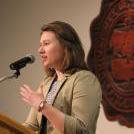-
Posts
16 -
Joined
-
Last visited
About Sandra Kruse
- Birthday 12/13/1994
Profile Information
-
Pronouns
she/her/hers
-
Location
Pittsburgh, PA
-
Interests
Choral music, baking and cooking, and you know... literature.
-
Application Season
Not Applicable
-
Program
M.A. in English
Recent Profile Visitors
2,650 profile views
Sandra Kruse's Achievements

Decaf (2/10)
7
Reputation
-
 Oklash reacted to a post in a topic:
The Best Gap Year Ever
Oklash reacted to a post in a topic:
The Best Gap Year Ever
-

The Best Gap Year Ever
Sandra Kruse replied to Sandra Kruse's topic in Literature, and Rhetoric and Composition
@Oklash Thank you for sharing your experience! That sounds far from "the best gap year ever" Good luck to you in the future! -
 ClassyBrat420 reacted to a post in a topic:
Do I need to TA in Masters to get into PhD programs?
ClassyBrat420 reacted to a post in a topic:
Do I need to TA in Masters to get into PhD programs?
-
 Sandra Kruse reacted to a post in a topic:
Do I need to TA in Masters to get into PhD programs?
Sandra Kruse reacted to a post in a topic:
Do I need to TA in Masters to get into PhD programs?
-
 Sandra Kruse reacted to a post in a topic:
The Best Gap Year Ever
Sandra Kruse reacted to a post in a topic:
The Best Gap Year Ever
-
The advice given to me essentially emphasizes scholarship and research experience over teaching experience. Writing Center work is a great bonus. I do not think that lacking a TA will harm you-- a PhD program is going to make you teach no matter what, so they likely won't emphasize that experience. That is all unless you feel like you want that experience before going into a PhD program. I feel comfortable without it.
-
 Oklash reacted to a post in a topic:
What questions should I ask potential grad programs?
Oklash reacted to a post in a topic:
What questions should I ask potential grad programs?
-
 Sandra Kruse reacted to a post in a topic:
The Best Gap Year Ever
Sandra Kruse reacted to a post in a topic:
The Best Gap Year Ever
-
The thing I know I will not be able to do but want to do anyway if I don't get a job after grad school would be food writing.
-
Congrats on getting into a program you're happy with! When you applied you likely saw a little bit, but definitely ask about funding. My masters program wasn't funded, but after some faculty got to know me they pointed some scholarships my way. Ask about teaching, research assistantships, stuff like that. It might not be the biggest deal for you to find a funding source, but almost all of those look good on CVs. If you're moving, ask about what the best neighborhoods are, where the good rent rates are, or if there are any property management companies to stay away from. This is an important part of being in a new place, but also is the kind of conversation that opens into where the good restaurants are, how the public transit works, and where the best places near campus are. Do you have a sense of how big your cohort is? Ask to see how many students are typically in your coursework. How easy will it be to make friends? Chances are if you're visiting, you already have a head-start on making connections to the students already there. That's good! If the department is research heavy, the faculty probably won't have any problem telling you about what kind of work they do. But if that should be the case, or if they're the kind of awkward professor type, ask them what kinds of classes they teach. What are their favorite classes to teach? I honestly find that is almost more of an indication of what kind of work you'll be able to do with them than what their last book was about. ---but even so that's not always the case! I'm sure others will contribute. Good luck!
-
Sandra Kruse started following The Best Gap Year Ever
-
Greetings~ I'm in a one year masters program, which I felt didn't give me enough time to prepare a successful PhD app [making a writing sample, getting letters of recommendation, really articulating what I want from a PhD program or faculty advisor, etc]. I will be taking a gap year before applying for PhDs in American Lit. I'll be staying in the same city, Pittsburgh, which has plenty of opportunities for English MAs. I'm not too worried about finding the best work for me, but I'm curious-- what are others doing for a gap year? If you did take a gap year, what did you do that made it successful? How did you balance work and preparation for applications? Were you very worried about finding something closely related to your field of study, or is Starbucks just fine? What do you think are the biggest differences between a gap year immediately after undergrad and gap years that are between graduate degrees?
-
Sandra Kruse started following Literature, and Rhetoric and Composition
-
 marisawhy reacted to a post in a topic:
Mentoring English MAs
marisawhy reacted to a post in a topic:
Mentoring English MAs
-

Mentoring English MAs
Sandra Kruse replied to marisawhy's topic in Literature, and Rhetoric and Composition
I totally understand your position! My undergraduate mentorship was honestly amazing. I had official and unofficial advisors in multiple departments. Because it was a smaller state school, the focus really was put on undergrads. The MA program I am currently in is also small. The faculty are great! But it's still a step back from the kinds of close relationships I'm used to. One part is definitely that it's only one year. But even so I have a hard time imagining that I could replicate the kind of mentor/mentee relationships of my past if I were to continue here for my PhD. It's not something that I ever could have guessed until I got here. To be completely honest, it's important to have female faculty members who are familiar with the kind of work I do, who know the same scholars I want to know, and can really "be in my corner" as I go through my PhD. I don't need someone to hold my hand, I'm pretty independent, but I do want someone who is going to be there for me. Graduate school is such a mess of professional and emotional stress that it's important, to me, to have someone that can help guide both parts of that experience. And some people just expect the rough and tough mentality of grad school. I won't be lonely that way. But it's hard to cut to the chase with a program to get at what they believe about mentorship. I'm still not sure what my strategy is going to be. Luckily, all my mentors from undergrad are still in touch with me and I can lean on them from across the country. -
When I started my masters I felt pretty set on saying 20thc was my focus, knowing that I'd have to be comfortable with the lit preceding it from the 19thc. I do love the 19thc! But I'm a little picky. I have very little interest in antibellum lit, at least in my own work. I can get excited for others still Not surprisingly, late 19thc is my main interest: Henry James, Edith Wharton, etc. etc.
-
Thanks for the input, lurkers! I'm pretty familiar with the strategies for studying. I did all that when I took the first test... it just kind of didn't matter that much! My undergrad definitely did not aim to prepare students for a test of that breadth. No amount of studying that summer could have really made that much of a difference. I think I will have to retake it. I plan on applying to programs of varying levels of "prestige," but definitely those in the top crust. I would be more confident with my applications if I can put a score that's at least around the 50th percentile--if that tells you anything about the score I'm working with now.
-
 Sandra Kruse reacted to a post in a topic:
GRE Literature Subject Test: A Discussion
Sandra Kruse reacted to a post in a topic:
GRE Literature Subject Test: A Discussion
-
 Sandra Kruse reacted to a post in a topic:
Is a 157V enough for English MAs?
Sandra Kruse reacted to a post in a topic:
Is a 157V enough for English MAs?
-

Is a 157V enough for English MAs?
Sandra Kruse replied to kerralyne's topic in Literature, and Rhetoric and Composition
I got very similar scores. I didn't rake in a million acceptance letters by any means, but I tried not to stress about it too much. I know it's late in the game and there's nothing left to do but wait... but I think your attitude seems pretty reasonable. I plan to retake it before reapplying to PhDs--I'm in a masters right now. -
Sandra Kruse started following GRE Literature Subject Test: A Discussion
-
It has been my impression that the GRE Lit Subject test has been slowly falling out of fashion. Despite that, we still have to play the game, don't we? From what I've seen, very few schools require it. Does anyone have a list of the schools that do? When I applied to UVA for my Masters, they accepted me without receiving my score, but since they technically required it, I needed to send my score anyway for administrative purposes. That sent a message to me: "We require this, but it is not that important." That being said, my score was...uh, not very good. I feel compelled to retake it before I apply for PhDs next cycle. But at the same time...maybe my poor score doesn't matter that much? Maybe it's just a formality? We know it's the writing and personal statement that stand out more to committees, but then why should we even bother? What are others' perspective on the importance of the Lit test? What were the best ways to prepare? How long did you study? Did you rely mostly on coursework/background, or additional study materials? Perhaps it would be more beneficial to have a separate thread for listing programs that require it, but I thought I'd give this a shot first.




